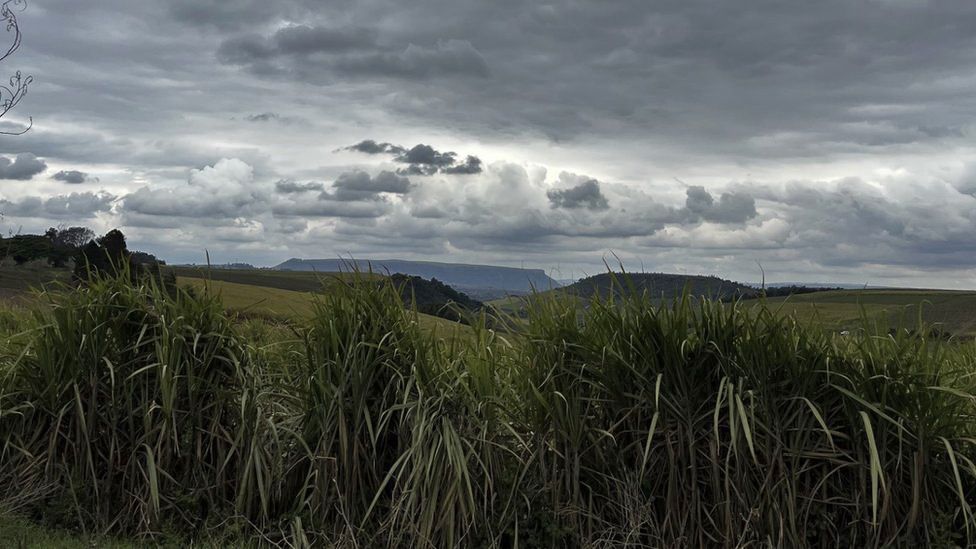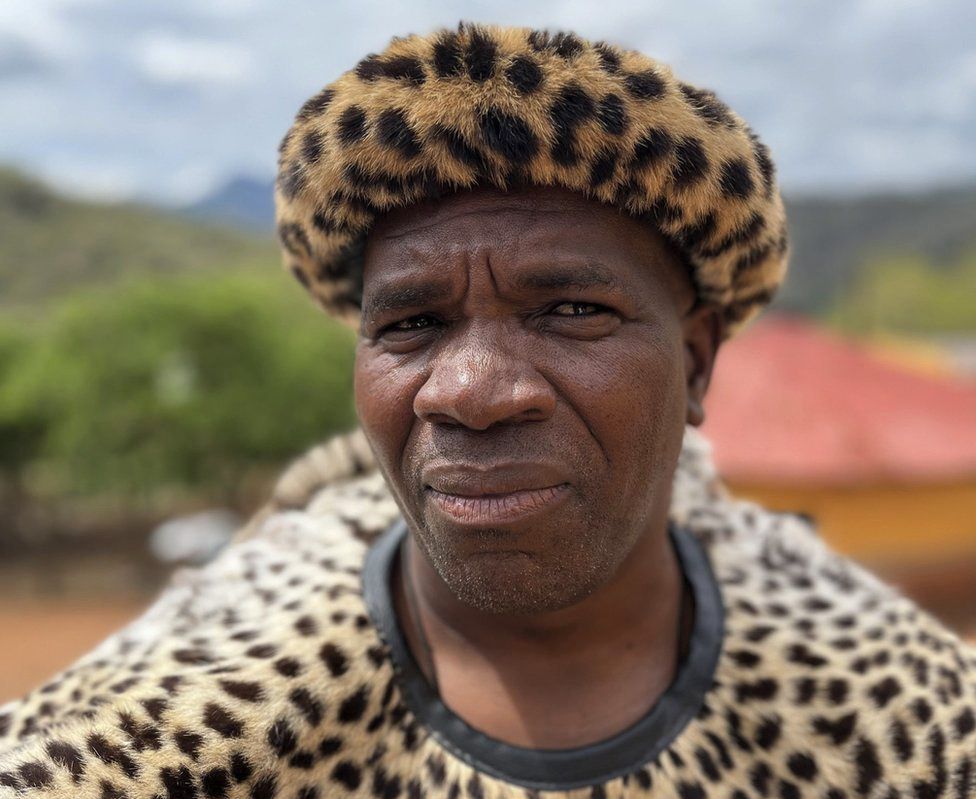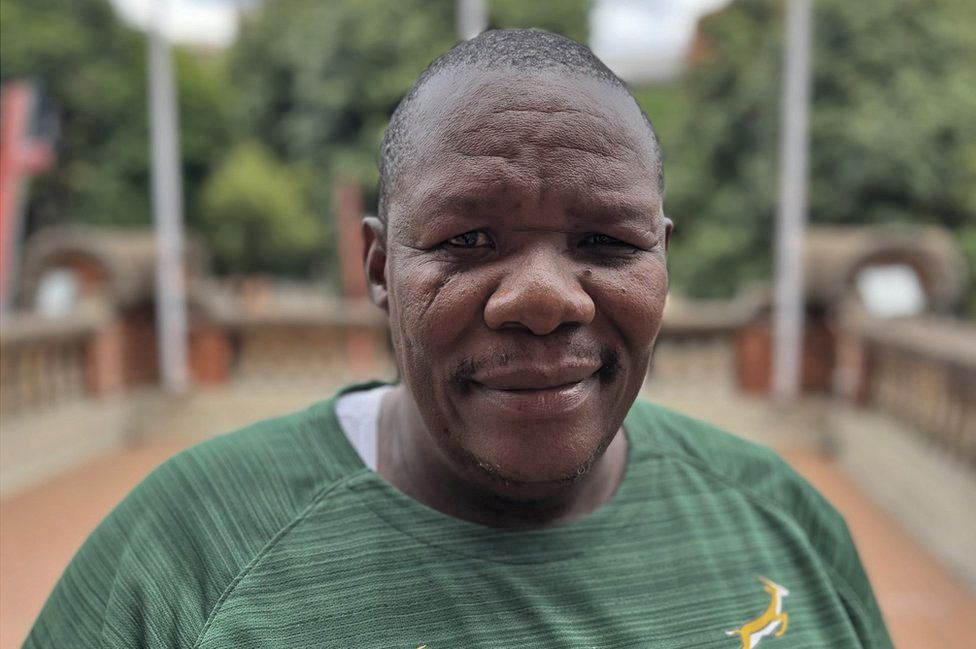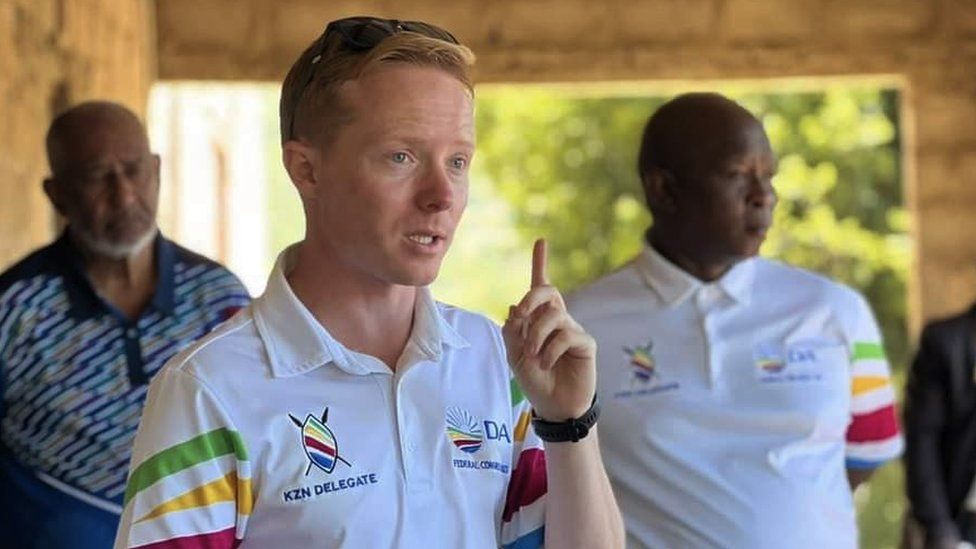Thirty years after the transition from apartheid to a democratic South Africa, Fergal Keane returns to a country experiencing increasing political violence in a key region to see what happened to the hopes and promises of a better nation.
Thembinkosi Lombo may not have known the man who gunned him down – but he may well have known the person who ordered the hit.
The 35-year-old local councillor from South Africa’s governing African National Congress (ANC) was shot dead in Greytown in the eastern coastal province of KwaZulu-Natal last year.
He left behind a wife and nine children – the youngest at just two months old.
His mother Lindeni Lombo, 75, tells us she believes the assassination was an inside job.
“He did tell me that from time to time there were cars that were suspicious that would follow him around,” she says. “My son told me that within the ANC there was some rivalry – those who were anti- and those who were pro-him.”
A 20-year-old man was arrested and charged with the murder in March last year. In the past 12 months more than 20 councillors have been killed in the region – it brings the number of elected representatives and local government officials killed in over a decade to more than 150.
‘Fighting for positions’
Mrs Lombo keeps a big election poster of her son as a reminder of his life and of her pride in his election victory. She lives in the ward he represented, a remote rural community set in the undulating hill country of KwaZulu-Natal.
Of the broader rise in political violence she says: “They’re fighting for positions.
“People want higher positions in the municipality, in the councils, and they are fighting all the time, competing for turf. They want money.”
Police Minister Bheki Cele said most of the dead councillors had been victims of internal political battles. The majority were from the ANC.
Elected office can bring access to local government budgets. Billions of rand have been lost through corruption involving officials and politicians.
In one notorious case, the school nutrition programme in the province collapsed because of corruption, leaving thousands of children from poor families without school meals.

KwaZulu means “place of the Zulus”, and has a long history of violence – from the 19th Century wars of King Shaka, the struggle against the British Empire, then against apartheid, and the conflict between political parties that threatened to derail South Africa’s transition to democracy in the 1990s.
But now the killings are frequently carried out by hitmen for hire – “inkabis” in the Zulu language. It can cost anywhere between 10,000 rand (£420; $535) to 500,000 (£21,000) to have a person killed. The higher the profile, the greater the price.
Drive out into the remote rural districts around provincial capital Pietermaritzburg and there is apprehension that next year’s elections will bring increased violence.

Alpheus Mzolo is a traditional leader in the Table Mountain district – a landscape of acacia trees and small settlements dominated by a brooding flat-topped mountain, not to be confused with the more famous Table Mountain in Cape Town.
Mr Mzolo is an “induna” (headman) for a powerful chief. In times of war the Indunas are responsible for raising and commanding the chief’s regiments. But his area is peaceful at the moment and he aims to keep it that way, refusing to align publicly with any party. The problem may come next year when political campaigning gets under way in earnest.
“Yes, I’m worried about it because it’s just near now,” he says. “Our people, will get affected by this… so that makes me worried. Because of the elections.
“Then you can see violence coming back and killing the people. Our own people.”
‘Children of paradise’
This is happening in a nation whose people were promised peace after the end of apartheid.
Thirty years ago this month, as he was presented with the Nobel Peace Prize, Nelson Mandela pledged South Africans would become “children of paradise” through recognising their shared humanity.
In Pietermaritzburg, I meet up with the ANC Mayor, Mzimkhulu Thebolla, and put it to him that the corruption and violence are an indictment of his party’s nearly 30 years in power.

“We have challenges in this country,” he says. “And some of those challenges are the corruption you’re talking about, the crime you’re talking about is the result of that. The underdevelopment of course is a result of that.
“But we are saying that undoing what has been done and created for over 300 years cannot only take 30 years to repair.”
Apartheid certainly left a bitter legacy – of violence, inequality and poor policing. There is also factional violence in some of the other political parties in KwaZulu-Natal.
But increasing numbers of South Africans are demanding that the ANC be held accountable for what has happened under its watch. In KwaZulu-Natal, that desire produced one of the more extraordinary local election results in South African history.
Two years ago, a white, Zulu-speaking, gay man was elected as mayor of uMngeni municipality, an area with nearly a three-quarters black majority.
Under the ANC, maladministration and corruption had wreaked havoc on the local budget.

Chris Pappas, 32, of the opposition Democratic Alliance, set about tackling corruption. Within a year his administration had balanced the books. Mayor Pappas knows that fighting back against the crooks is a potentially risky endeavour.
“The biggest fear I have is from contractors, not so much politicians, but contractors,” he says.
“As you start to unpack the supply chain systems of a municipality, you find all sorts of irregularities. And, you know, the right thing to do is to stop contracts, cancel them… claw back money.
“And that’s bread and butter for people. That’s no longer about political power, but that’s about people keeping their lifestyles going.”
He is one of the youngest mayors in the country and was only three years old when Nelson Mandela became president after the first democratic election in April 1994.
‘People want peace and prosperity’
Now Mr Pappas is his party’s candidate for the premiership of the entire province of KwaZulu-Natal. Was he surprised that as a young, white, gay man he managed to garner such support in a largely black and socially conservative area?
“I think it reaffirms what many South Africans think generally, and that is that identity is not what drives our primary election motives,” he says.
“I think what many people want to see is general peace and general prosperity. Issues of racism and issues of identity do feature in our country strongly. But I think when it comes to just moving the needle forward in terms of service delivery and progress, people just want to get things done.”
The violence is deeply embedded in KwaZulu-Natal and while corruption cases are being prosecuted, what is described by anti-corruption campaigners as the “looting” of public resources is daunting. But South Africa’s democracy does offer the possibility of change.
That is why next year’s elections could be the most consequential since those first non-racial polls 30 years ago.
In South Africa, the present – let alone the future – seems to hang in the balance.
Source : BBC
















